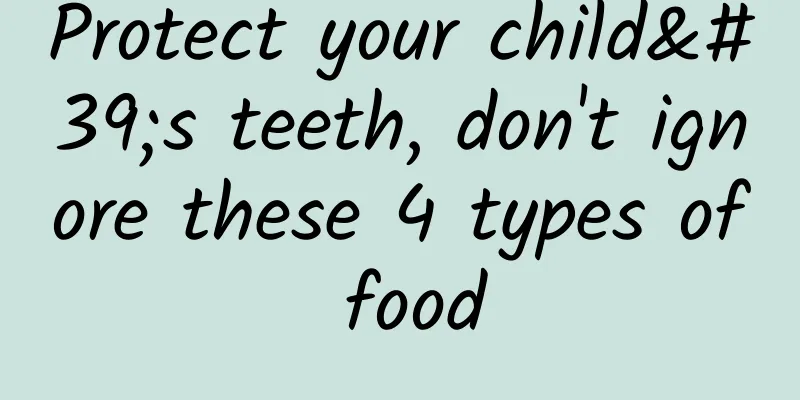Protect your child's teeth, don't ignore these 4 types of food

|
When babies have tooth decay, many parents often blame it on candy. They do a good job of controlling their babies’ sugar intake, but even so, their babies still get tooth decay. In fact, the main cause of tooth decay is that food residues in the mouth continuously provide nutrients to bacteria. Sugar is the favorite of bacteria in the mouth. When bacteria decompose food residues such as sugar, they produce acidic substances that cause tooth corrosion, which gradually demineralizes and softens, forming tooth decay. It is right to protect children's teeth from tooth decay and control their candy intake, but there are some foods that also require special attention. Category 1: Representative foods high in starch: bread, steamed buns, potatoes, etc. High-starch foods are rich in carbohydrates. After entering the mouth, carbohydrates are broken down into sugars by salivary amylase. These sugars are broken down by bacteria in the mouth and produce acid, which corrodes the teeth and causes tooth decay. In addition, the debris of high-starch foods is very difficult to clean and easily adheres to the teeth, forming a layer of yellow soft plaque on the tooth surface, which also creates a "favorable" environment for the growth of harmful bacteria. Solution: When feeding your baby three meals a day, you can choose high-fiber, high-starch foods as staple foods, such as whole grains. You can also choose to pair high-starch foods with vegetables and fruits rich in crude fiber, such as celery and broccoli. The friction of the fiber will have a cleaning effect and remove harmful substances and dental plaque adhering to the surface of the teeth. At the same time, high-fiber foods require more chewing, which will promote the secretion of more saliva, help remove acidic substances and enzymes on the surface of the teeth, and help stimulate the child's jaw development and tooth germination. The second category: Representative foods of high viscosity: dried mangoes, raisins, dried cranberries and other dried fruits. After the fruit is dried, the water evaporates and the sugar content is greatly increased. In addition, the dried fruit is very sticky and it is very difficult to clean it. Young babies do not have a good habit of brushing their teeth yet. These fructose-rich and sticky dried fruits can easily cause tooth decay in babies. Solution: It is not recommended for babies to eat dried fruits. It is better to eat fresh fruits. If the baby really likes to eat dried fruits, you can eat them with water and control the frequency of eating to less than 3 times a day. It is best to rinse your mouth, brush your teeth, and use dental floss after eating dried fruits, which helps to clean the sticky substances on the surface of the teeth. If conditions do not allow, you can let the child rinse his mouth with clean water. The third category: Representative foods of high acidity: citrus, pineapple, lemon, etc. Long-term and excessive consumption of foods with high organic acid content will cause the pH level on the tooth surface to drop, demineralize the teeth, soften the enamel, and create "favorable" conditions for tooth decay. Solution: When highly acidic fruits are in season, it is recommended that children eat 100 to 200 g of them per day, alternating with other foods and rinsing their mouths or drinking water after eating. The fourth category: Representative foods of sugar-free beverages: homemade juice, soda water, etc. We are afraid that children may have tooth decay, so we will control their consumption of sugary drinks. However, we will choose to give our children some natural and healthy sugar-free juices, such as fruit juice, orange juice, lemon juice, etc. Sometimes we also make homemade juice for children. In fact, we often overlook the sugars in the juice! The sugar in whole fruits is non-free sugar, which is wrapped by a layer of plant cell wall and has a slow digestion process, so fresh and whole fruits are not easy to cause caries; after the fruit is made into juice, the sugar is released from the cell wall and becomes free sugar, which increases the caries-causing property. In addition, the acidic substances in sugar-free juice can also cause tooth corrosion and the risk of tooth decay. Similarly, sugar-free carbonated beverages, such as soda water, will keep teeth in an acidic environment and cause damage if consumed continuously for a long time. Solution: It is recommended to feed children whole fruits instead of juice. If they want to drink juice, try to reduce the frequency of juice drinking, such as 1-2 times a week. The American Academy of Pediatrics reminds: Juice is not recommended for babies under 12 months old. For children aged 12-36 months, if they want to drink juice, the daily amount of juice should not exceed 120 mL, and they should drink it as soon as possible with a water cup, and avoid using a straw cup to drink throughout the day. To prevent tooth decay in children, it is more important to develop good dental and cleaning habits. In addition to three meals a day, children should eat snacks less than 3 times a day; rinse their mouths with water after eating; brush their teeth at least twice a day, and brush their teeth for 2 to 5 minutes each time; after two teeth grow out, it is recommended to use children's dental floss for babies to better remove food residues. |
Recommend
What should mothers do if their gums are swollen and painful during breastfeeding?
Spring is the season when people are most likely ...
What are the advantages and disadvantages of eating dried sweet potatoes frequently? What kind of food is dried sweet potatoes?
Dried sweet potatoes, also known as sweet potato,...
What is the significance of biparietal diameter examination at 40 weeks
The general pregnancy period for our female frien...
These are the best foods for women with kidney deficiency. If you don’t believe me, try it!
Nowadays, people are under great pressure in life...
Recent light menstrual flow
Some female friends may find a problem that their...
What are the clinical characteristics of appendicitis in pregnant women?
Appendicitis in pregnant women is also known as g...
Where is the female kidney located?
For each part of the human body, it is estimated ...
The fetal movement there proves that it has entered the pelvis.
In the late pregnancy, the fetus will move its he...
What medicine can be used to induce abortion?
After a pregnant woman becomes pregnant, she is c...
How often is it best for women to steam themselves?
It is generally best for women to steam once ever...
What to do if a pregnant woman vomits after eating
When you are pregnant, you will feel irritable an...
How to avoid cholestasis when having a second child?
With the opening of the second-child policy, many...
Can I use a test strip to detect pregnancy after having sex for a week?
The plan for having a baby requires active prepar...
The secret killer of women's reproductive triangle
Gynecological diseases are common and frequently ...
Pregnant woman's heart beats fast after meal
Pregnant women are a group that is prone to speci...









